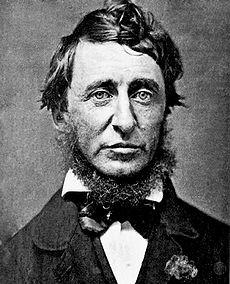 Literature aficionados may already be familiar with American author Henry David Thoreau’s other hats: in addition to being an outspoken abolitionist, philosopher, and historian, he was a avid naturalist and lover of the outdoors. Looking at Walden Pond, the subject of Walden, a Life in the Woods, one could understand why Thoreau found such peace and inspiration in nature.
Literature aficionados may already be familiar with American author Henry David Thoreau’s other hats: in addition to being an outspoken abolitionist, philosopher, and historian, he was a avid naturalist and lover of the outdoors. Looking at Walden Pond, the subject of Walden, a Life in the Woods, one could understand why Thoreau found such peace and inspiration in nature.
Not only did write of his love for nature. Thoreau also wrote about his favorite means of appreciating nature – walking.
I think that I cannot preserve my health and spirits unless I spend four hours a day at least — and it is commonly more than that — sauntering through the woods and over the hills and fields absoutely free from all wordly engagements. You may safely say a penny for your thoughts, or a thousand pounds. When sometimes I am reminded that the mechanics and shop-keepers stay in their shops not only all the forenoon, but all the afternoon too, sitting with crossed legs, so many of them — as if the legs were made to sit upon, and not to stand or walk upon — I think that they deserve some credit for not having all committed suicide long ago.On what it means to “saunter”:
I have met with but one or two persons in the course of my life who understood the art of Walking, that is, of taking walks, who had a genius, so to speak, for sauntering; which word is beautifully derived “from idle people who roved about the country, in the middle ages, and asked charity, under pretence of going à la sainte terre” — to the holy land, till the children exclaimed, “There goes a sainte-terrer”, a saunterer — a holy-lander.
Ralph Waldo Emerson on Thoreau:
The length of his walk uniformly made the length of his writing. If shut up in the house, he did not write at all.
What would Thoreau think of modern times?
 When we walk we naturally go to the fields and woods; what would become of us if we walked only in a garden or a mall?” Even some sects of philosophers have felt the necessity of importing the woods to themselves since they did not go to the woods, “They planted groves and walks of Platans” where they took subdiales ambulationes in porticoes open to the air. Of course, it is of no use to direct our steps to the woods, if they do not carry us thither. I am alarmed when it happens that I have walked a mile into the woods bodily, without getting there in spirit. In my afternoon walk I would fain forget all my morning occupations, and my obligations to society. But it sometimes happens that I cannot easily shake off the village. The thought of some work will run in my head, and I am not where my body is; I am out of my senses. In my walks I would fain return to my senses. What business have I in the woods, if I am thinking of something out of the woods? I suspect myself, and cannot help a shudder, when I find myself so implicated even in what are called good works — for this may sometimes happen.
When we walk we naturally go to the fields and woods; what would become of us if we walked only in a garden or a mall?” Even some sects of philosophers have felt the necessity of importing the woods to themselves since they did not go to the woods, “They planted groves and walks of Platans” where they took subdiales ambulationes in porticoes open to the air. Of course, it is of no use to direct our steps to the woods, if they do not carry us thither. I am alarmed when it happens that I have walked a mile into the woods bodily, without getting there in spirit. In my afternoon walk I would fain forget all my morning occupations, and my obligations to society. But it sometimes happens that I cannot easily shake off the village. The thought of some work will run in my head, and I am not where my body is; I am out of my senses. In my walks I would fain return to my senses. What business have I in the woods, if I am thinking of something out of the woods? I suspect myself, and cannot help a shudder, when I find myself so implicated even in what are called good works — for this may sometimes happen.
